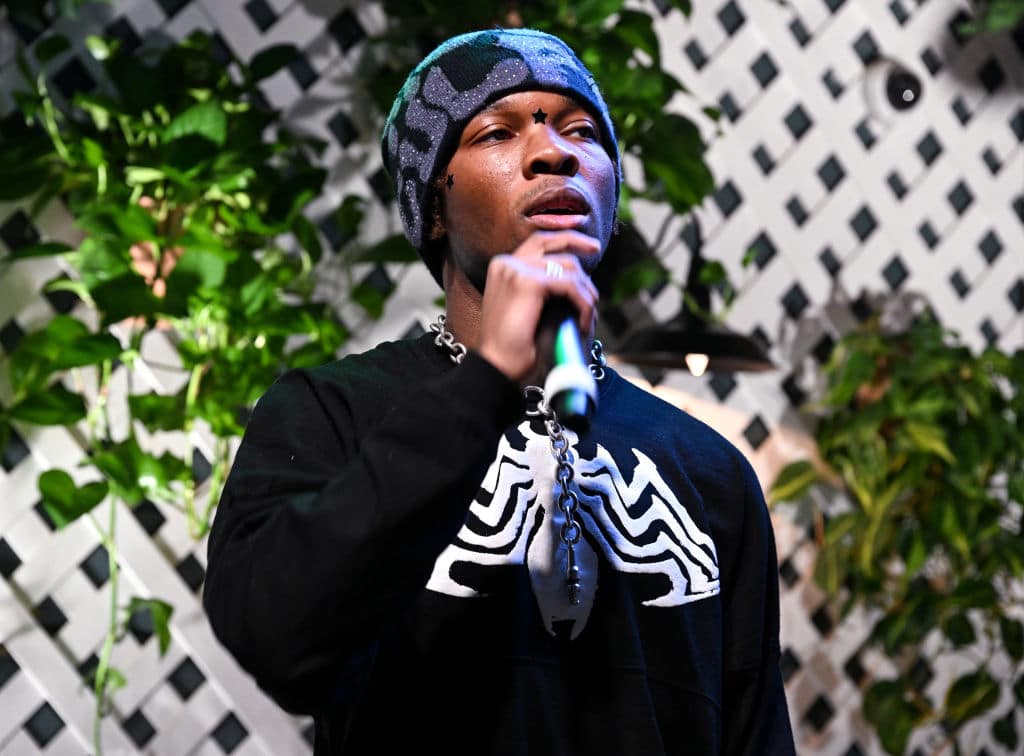Blog
Page: 29
Getty Images / Alexandria Ocasio-Cortez / Donald Trump
Congresswoman Alexandria Ocasio-Cortez is just like everyone else, wondering what in the world is up with Donald Trump’s mental state.
AOC blasted the current occupant in the White House after he continually lied and called for six Democrats, Michigan Sen. Elissa Slotkin, Arizona Sen. Mark Kelly, Pennsylvania Reps. Chris Deluzio and Chrissy Houlahan, New Hampshire Rep. Maggie Goodlander, and Colorado Rep. Jason Crow are facing the death penalty and are being accused of being traitors on Truth Social after they dropped a video reminding them not to follow illegal or unconstitutional orders.
“To be honest, the president’s remarks are, I think, indicate a level of instability, ” AOC said while speaking with reporters.
Love Hip-Hop Wired? Get more! Join the Hip-Hop Wired Newsletter
We care about your data. See our privacy policy.
She continued, “It’s not just shocking, it’s not just offensive, it’s bizarre, it is erratic, it’s volatile. And I think it indicates a mental state that we should all be questioning right now, whether that’s emotional, mental, what have you.”
“It is not normal to make these accusations, it is not normal to invoke these kinds of threats of violence. And it’s also not normal to also dramatically misquote, as Karoline Leavitt was doing, what these members of Congress said.”
“They made a very clear message to U.S. service members, which is that you do not have to obey an illegal order.”
“And I think that’s an important message to reiterate, because this administration seems to be increasingly trying to go down that path.”
Where is the lie?
Donald Trump Is Surrounded By Loyalists Who Don’t Question Him
Unlike his first term, when there were people bold enough to tell Trump no, this time around, he’s surrounded by loyal sycophants willing to do his bidding and enact ridiculous things that come to mind.
For example, to prove his undying loyalty, our current DEI hire of a Defense Secretary, Pete Hegseth, is hinting at looking into investigating those who participated in the video.
Hegseth is currently focusing on Mark Kelly, after the highly decorated veteran shared a photo of medals, accusing Kelly of showing his medals out of order, and that he will get an “uniform inspection” when he’s recalled to active duty.
Apparently, Hegseth doesn’t understand how cameras work.
We can’t wait to see this latest nonsense from Trump and his administration epically backfire.
You can see more reactions in the gallery below.

Trending on Billboard
Before it was lights out at the Formula 1 Las Vegas Grand Prix over the weekend, Beyoncé and Jay-Z linked up with Lewis Hamilton on the track — after which the Destiny’s Child alum gassed up the racing champion on Instagram.
On Tuesday (Nov. 25) — two days after the big race — Bey shared a carousel of photos of herself and Jay chatting with Hamilton, who took the 35-time Grammy winner on a drive around the circuit in a Ferrari model. The musical power couple was all smiles while chatting with the seven-time world champion, with Bey showing up and out in a glamorous F1-inspired jumpsuit.
“Love and gratitude to the best to ever do it! Lewis Hamilton #44!” she praised the driver, who would go on to place eighth in the Vegas Grand Prix. Red Bull Racing’s Max Verstappen finished first, followed respectively by George Russell and Kimi Antonelli of Mercedes.
Bey also shared videos of herself strutting through Sin City and enjoying the race-weekend offerings, as well as a clip of Hamilton driving her on the track captioned, “Give it to Mama!”
She and Jay were just two of the many A-listers who were present at the event in Vegas, which seems to attract more and more stars each year. Travis Scott was also on the ground, as were Cynthia Erivo, Magic Johnson, Brooks Nader, Michael Douglas, Catherine Zeta-Jones, Gordon Ramsay, Ciara and Ben Affleck.
Their attendance goes to show how large F1’s presence in culture has become in recent years. Earlier this fall, everyone from Adele to Shaboozey, Matthew McConaughey, Jay Leno and Glen Powell descended on Austin, Texas, to watch the U.S. Grand Prix, which featured live performances from Kygo, Garth Brooks and the Turnpike Troubadours. In June, an original F1 movie starring Brad Pitt — and featuring a star-studded soundtrack — premiered in theaters.
“The whole thing is a show,” Williams Racing’s Alex Albon told Billboard on site at the time “It’s entertainment, and I think if you can get these huge stars coming to these races, it just makes the weekend and the day so much better.”
Trending on Billboard
Sublime are getting into the festival game. The long-running reggae punk band announced the debut of their first-ever touring festival, Sublime Me Gusta, which is slated to debut in Forth Worth, Texas on May 9 at the Panther Island Pavilion. According to a release announcing the event, the “beginning of a national festival series built around the timeless sound, spirit and cultural impact” of the band takes its name from the lyric “Me gusta mi reggae, me gusta punk rock” from the trio’s iconic song “Caress Me Down” from their 1996 self-titled debut album.
Explore
See latest videos, charts and news
“The festival embodies everything Sublime stands for: sun-soaked vibes, rebellious spirit, and a love for music without boundaries,” reads the release. Tickets for the festival start at $89.99 for general admission and are available here now.
“It’s always been our dream to put on a Festival for our friends and family,” says Sublime singer Jakob Nowell, son of the band’s late, original singer Brad Nowell. “It’s punk rock, hip hop, reggae, surf — all facets of true west coast alternative culture that has been kept alive for generations by fans and musicians alike. This is our era now and we got nothing but love for everyone coming with us.”
The band will be joined on the bill by their longtime friends in fellow reggae punk band Slightly Stoopid for what is described as an “immersive day of live music, community and good vibes.” A full festival lineup will be announced in the coming weeks. The event is being co-produced by Sublime and independent promoter Brew Ha Ha Productions.
A second stop in Oregon on June 27 has also been announced, though a city and venue were not revealed at press time. Each show will feature a hand-picked lineup of bands that bridge the punk-reggae gap, with the promise of a full day of music, vendors, art, food and drinks.
“As someone who lives in the Dallas-Fort Worth area, I couldn’t be more excited to launch the first-ever Sublime Me Gusta Festival right in our own backyard,” event co-producer Cameron Collins of Brew Ha Ha Productions said in a statement. “Sublime and Slightly Stoopid are two of the most influential bands of our generation and bringing them together for this new festival is something truly special. Fort Worth is the perfect place to kick off Sublime Me Gusta, and we can’t wait to share the full experience with everyone.”
Sublime was formed in Long Beach, Calif. in 1988 by singer/guitarist Nowell, bassist Eric Wilson and drummer Bud Gaugh. The band’s self-titled third album was released two months after 28-year-old Nowell’s death from a drug overdose, peaking at No. 13 on the Billboard 200 album chart. The band broke up in 1996 following Nowell’s passing and reformed in 2009 with fan Rome Ramirez taking over vocal/guitar duties, changing their name to Sublime With Rome.
Gaugh, who had split in 2011, rejoined the band in 2023 when Jakob Nowell took over as lead singer, followed by the dissolution of Sublime with Rome in 2024. In May of that year the band released their first new song in almost 28 years, “Feel Like That,” followed by the single “Ensenada.” Earlier this year, Sublime revealed that Nowell has been in the studio with Blink-182 drummer/producer Travis Barker and producer John Feldmann writing songs for the trio’s first new full-length album in three decades.
Check out the Sublime Me Gusta festival poster below.
Trending on Billboard Mario may like to get up close and personal with fans at his shows, but one woman crossed the line at his recent stop in Detroit, inappropriately feeling up the singer’s crotch as he was performing on stage. In a video captured by someone else at the concert posted Monday (Nov. 24), […]
We trust that, at this point, you’ve planned the details of cooking your Thanksgiving dinner. (Or, perhaps smarter, that you’ve secured reservations at a nearby restaurant.)
But, what about the music to accompany your Thanksgiving Day festivities?
Related
As you celebrate the holiday with loved ones, let Billboard serve your musical soundtrack. Please feel free to fill up a playlist, as you fill up at the table, from a vast menu of Thanksgiving-appropriate charted songs and acts.
From everyone at Billboard, have a happy, healthy and safe Thanksgiving!
First, the Sides
“Mashed Potato Time” Dee Dee SharpA No. 2 hit on the Billboard Hot 100 in 1962
“Gravy (For My Mashed Potatoes)” Dee Dee SharpNo. 9 Hot 100, 1962
“Mr. Potato Peeler” Bobby Gregg and His FriendsNo. 89 Hot 100, 1962
“Mashed Potatoes U.S.A.” James Brown and the Famous FlamesNo. 82 Hot 100, 1962
“Gravy Waltz” Steve AllenNo. 64 Hot 100, 1963
“My Sweet Potato” Booker T. & the MG’sNo. 85 Hot 100, 1966
“Hot Potato” LaToya JacksonNo. 38 Dance Club Songs, 1984
And, anything by … the Cranberries
(Honorable, and mostly mouth-watering, mention, to a song that charted only as a cut on Bobby Bare’s album Bare, which reached No. 44 on Top Country Albums in 1978: “Greasy Grit Gravy and Gizzard Greens” (which, per the lyrics, “make you wanna split your jeans”)
Ah … the Main Course
[embedded content]
“Let’s Turkey Trot” Little EvaNo. 20 Hot 100, 1963
“Birdland” Chubby CheckerNo. 12 Hot 100, 1963 63
“Surfin’ Bird” the Trashmen (although you may be more familiar with this version)No. 4 Hot 100, 1964
“This Little Bird” Marianne FaithfullNo. 32 Hot 100, 1965
“May The Bird of Paradise Fly Up Your Nose” “Little” Jimmy DickensNo. 15 Hot 100, 1965
“Cold Turkey” Plastic Ono BandNo. 30 Hot 100, 1970
“Jive Turkey (Part 1)” Ohio PlayersNo. 47 Hot 100, 1974
“Free Bird” Lynyrd SkynrydNo. 19 Hot 100, 1975
“Three Little Birds” Bob Marley and the WailersNo. 1 Reggae Digital Song Sales; released in 1977
“The Bird” the TimeNo. 36 Hot 100, 1985
[embedded content]
“I’m Like a Bird” Nelly FurtadoNo. 9 Hot 100, 2001
“Gobble Gobble” Matthew WestNo. 32 Christian Airplay, 2020
“Birds of a Feather” Billie EilishNo. 2 Hot 100, 2024
And, anything by … the Byrds
Please Be Specific
“Skinny Legs and All” Joe TexNo. 10 Hot 100, 1967
“Hot Legs” Rod StewartNo. 28 Hot 100, 1978
“Legs” ZZ TopNo. 8 Hot 100, 1984
“Broken Wings” Mr. MisterNo. 1 Hot 100, 1985
“Pretty Wings” MaxwellNo. 33 Hot 100, 2009
Or, anything by … Wings
And, for Dessert
“Sweet Potato Pie” James TaylorNo. 37 Adult Contemporary, 1989
“Sweet Potato Pie” DominoNo. 13 Hot R&B/Hip-Hop Songs, 1994
And, anything by … Smashing Pumpkins
Musical Trimmings
“I Wanna Thank You” Bobby RydellNo. 21 Hot 100, 1961
[embedded content]
“Thank You Girl” the BeatlesNo. 35 Hot 100, 1964
“I Thank You” Sam & DaveNo. 9 Hot 100, 1968
“Thank You Falettinme Be Mice Elf Agin” Sly & the Family StoneNo. 1 Hot 100, 1970
“Be Thankful for What You Got” William DeVaughnNo. 4 Hot 100, 1974
“Thank God I’m a Country Boy” John DenverNo. 1 Hot 100, 1975
“Thank You for Being a Friend” Andrew GoldNo. 25 Hot 100, 1978
Of course …
[embedded content]
“The Thanksgiving Song” Adam SandlerAn annual No. 1 on Comedy Digital Songs (which Sandler premiered on NBC’s Saturday Night Live on Nov. 21, 1992)
“Thank U” Alanis MorissetteNo. 1 Adult Pop Airplay, 1998
“Thank You” DidoNo. 1 Adult Contemporary, Adult Pop Songs, Dance Club Songs, 2001
“I Wanna Thank Ya” Angie StoneNo. 1 Dance Club Songs, 2004
“Thnks fr th Mmrs” Fall Out BoyNo. 11 Hot 100, 2007
“I Want to Say Thank You” Lisa Page Brooks featuring Royal PriesthoodNo. 1 Hot Gospel Songs, 2010
“Thank U, Next” Ariana GrandeNo. 1 Hot Hot 100, 2018
“thanK you aIMee” Taylor SwiftNo. 23 Hot 100, 2024
And, a still piping-hot entry (entree?):
“All About That Baste,” courtesy of the Holderness Family, which knows how to cook up, in addition to a tasty turkey, a catchy parody. (#noskinnybritches)
[embedded content]
Trending on Billboard
The Viña del Mar International Song Festival 2026, set to take place from Feb. 22 to 27, promises an electrifying week of music that includes Gloria Estefan, Pet Shop Boys, Jessy & Joy, Juanes, Mon Laferte and Paulo Londra.
Explore
See latest videos, charts and news
Dubbed “the largest Latin festival in the world,” the full six-day lineup of the 65th annual festival was revealed on Tuesday (Nov. 25). Macarena Ripamonti, mayor of Viña del Mar, stated in the press release, “We achieved a historic milestone by presenting 100% of the musical lineup at once, receiving very good feedback from people, with artists for all tastes and needs, as it should be.”
Most days of the storied Chilean festival will feature three performers — a change from the usual two. On Sunday (Feb. 22), Gloria Estefan will headline alongside Matteo Bocelli, with one additional artist yet to be announced. Monday will bring British legends Pet Shop Boys and Colombian duo Bomba Estéreo to the stage.
K-pop sensation NMIXX — comprised of Haewon, Sullyoon, Bae, Jiwoo, Kyujin and Lily — and Mexican duo Jessy & Joy will take the mic on Tuesday (Feb. 24). Midweek performances on Wednesday will feature Colombian rocker Juanes alongside Argentine cumbia band K Personajes, and Thursday will see Chilean powerhouse Mon Laferte and Puerto Rico’s Yandel Sinfónico deliver their sets. The festival will close on Friday (Feb. 27) with four performers, three already confirmed: Paulo Londra, Pablo Chill-E and Milo J.
“This event, the largest in the country, represents a driver of economic development and significant direct job creation for our city,” stated Mayor Ripamonti. “That is why it is so important to welcome millions of tourists and all the residents who will enjoy the World’s Largest Latin Festival.”
Pre-sale tickets will be available through Santander and Entel starting Wednesday (Nov. 26) until Friday, Nov. 28, at 11 a.m. local time. General sales will begin on Friday, Nov. 28, at 11:30 a.m. local time via Puntoticket.
Trending on Billboard Taylor Swift’s “The Fate of Ophelia” rises a spot to No. 1 on Billboard’s Adult Pop Airplay chart dated Nov. 29. The song becomes her 14th leader on the list, the most among soloists. Overall, only Maroon 5 has more, with 15. The track became the highest debuting hit in the chart’s […]
Source: Michael Kovac / Getty
More than two months after the discovery of Celeste Rivas’ body, the LAPD has begrudgingly begun releasing more information to the public after naming d4vd a suspect.
Los Angeles Police Captain Scot Williams told People that previous reports from places like TMZ that Rivas was found decapitated or frozen are false.
“Celeste’s body was not frozen,” Williams says. “She was not decapitated. The whole frozen thing doesn’t even make sense. Her body was in the car for weeks.”
Love Hip-Hop Wired? Get more! Join the Hip-Hop Wired Newsletter
We care about your data. See our privacy policy.
Williams added that “Even if she had been frozen solid when she was put in the car (which there is NO evidence to suggest she was), five or more weeks in the trunk of a car in sweltering heat in the middle of summer would not have resulted in a partially frozen body being discovered on September 8th.”
But still, the investigation has remained purposely under wraps because a Los Angeles Police detective says revealing all the autopsy findings would impede the investigation.
LAPD Det. Joshua Byers filed a declaration where he wrote giving more information about the case to the public “will reveal or tend to reveal the ongoing investigation and the integrity of the investigation as well as the identity of witnesses and/or informants who are cooperating with law enforcement and the content of the information they have provided, which could endanger the lives of witnesses and/or compromise the investigation.”
So Los Angeles Superior Court Judge Craig Richman granted the request and ordered that the medical examiner’s findings be sealed.
The LAPD’s reports now conflict with TMZ’s from just a few days ago that said Rivas was “decapitated” and that “while the torso was intact, the limbs had been removed and cut into multiple pieces.” It said her remains were “partially frozen” and were thawing when they were found in the trunk of d4vd’s Tesla. His car was found sitting on the streets of Hollywood Hills in early September and was then taken to a tow yard. That’s when workers noticed a foul smell and called the police, who discovered the dead body of the 14-year-old.
Rumors of her being frozen even led TMZ to discover that the house d4vd rented — and was searched by LAPD— had a freezer large enough to hide her body.
RELATED: Singer d4vd Reportedly Named A Suspect In Celeste Rivas’ Death
LAPD Refutes Report That Celeste Rivas’ Body Was Found Decapitated & Frozen In d4vd’s Trunk
was originally published on
cassiuslife.com

Pool / Erika Kirk / JD Vance
Erika Kirk and Turning Point USA are all in on a JD Vance presidency.
Speaking with Megyn Kelly, Charlie Kirk’s widow was asked by the conservative podcaster about backing a JD Vance presidential ticket, and her answer shouldn’t really come as a surprise to anyone who has been paying attention.
Kirk told Kelly, “It’s in the works. This was a thing my husband was very direct about. One of the last few conversations we had was how intentional he was for supporting JD in 2028.”
Turning Point USA is a conservative student advocacy group that was instrumental in helping Trump win the 2024 election by bolstering the youth turnout. The organization’s founder was assassinated while at a “Prove Me Wrong” campus event in Utah in September.
Love Hip-Hop Wired? Get more! Join the Hip-Hop Wired Newsletter
We care about your data. See our privacy policy.
During the interview, at Kelly’s Glendale, Arizona, tour stop, the current CEO of Turning Point USA confirmed her unwavering support for the Vances. Both the Vice President and his wife accompanied the body of Charlie Kirk aboard Air Force II, with Vance even helping with carrying the casket across the tarmac in Salt Lake City, Utah.
Is There Something Weird Going On Between Erika Kirk & JD Vance?
Speaking on the support she has received from Vance since her husband’s death, Kirk said it “has been a blessing” and that the VP and his wife, Usha, have shown her “genuine love.”
All of this is interesting because Kirk and Vance’s relationship has been put under a microscope following what social media deemed as a very awkward embrace between the “two friends” with Kirk touching the back of the married VP’s head while at a Turning Point USA event at the University of Mississippi honoring Charlie Kirk back in October.
When introducing Vance to the crowd, Kirk said, “No one will ever replace my husband, no, but I do see some similarities between my husband and JD,” which had folks on social media saying, “What?”
Kelly asked Kirk about that exact moment, and she downplayed it as an embrace between them out of mutual respect while explaining the head touching.
“They just played the emotional video. I’m walking over, he’s walking over. I’m starting to cry,” Kirk told Kelly.
“And I say, ‘God bless you,’ and I touch the back of his head. Anyone who I have hugged, that I have touched the back of your head when I hug you, I always say, ‘God bless you.’”
“That’s just me,” Kirk continued.
“If you want to take that out of context, go right ahead. Again, that to me shows that you need a hug.”
Interesting.
Does Donald Trump Approve of Erika Kirk Supporting JD Vance for President?
Then there’s also the small matter of the talk of Trump running for a third term, which is unconstitutional, but according to Steve Bannon, it’s something he and his team are actively working on, and Trump has been teasing that he will run again with the release of “Trump 2028.
Despite being a loyal lapdog, Trump hasn’t even thought about giving Vance his blessing to replace and keep the MAGA movement going.
Welp.
Then, some have noticed that Vance’s wife, Usha, whom he wished was Christian, was spotted no longer wearing her wedding ring, only adding more fuel to Vance/Kirk rumors.
We are very intrigued to see how this entire situation plays out.
You can see more reactions below.
The nights are getting longer, the days are getting colder, and the holidays draw near. Now, more than ever, you need the warming balm of laughter, and we’ve got you covered: two established voices this time out and two you may not know, presented in alphabetical order. Leslie Jones and Michelle Wolf, of course, are […]

 State Champ Radio
State Champ Radio 





